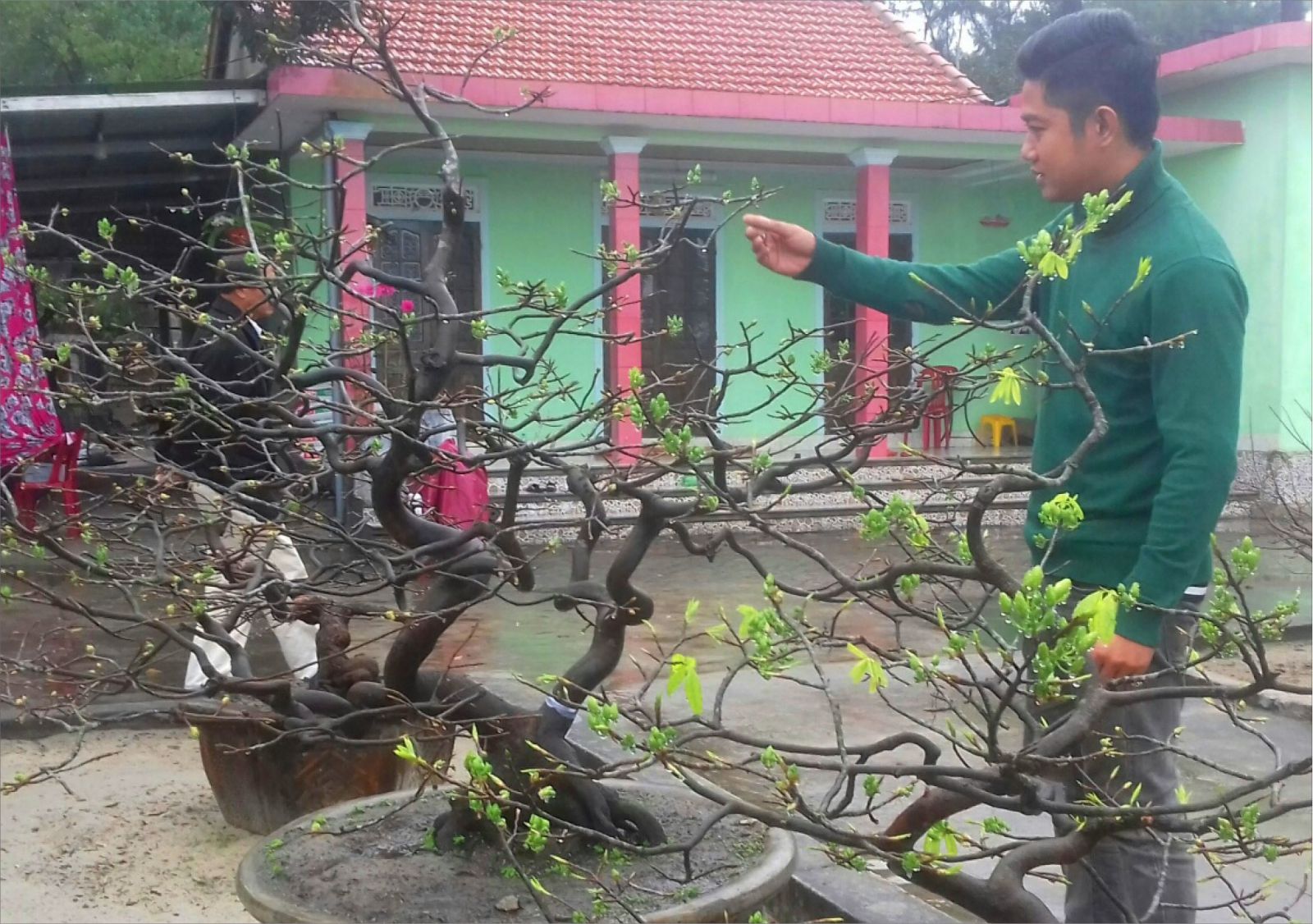
Mr. Nguyen Nhat Tuong is taking care of an apricot blossom tree to time its bloom on the occasion of Tet 2018 – the Year of Dog
The tradition
At present, all houses in Dien Hoa commune have at least some to nearly a hundred apricot trees. The apricot growers take seeds from their beautiful flower trees to propagate. Growing apricot blossoms not only brings economic benefits, but also preserves the beauty of traditional culture. A beautiful apricot blossom tree with high market value is one with a gracefully-shaped trunk and full branches, which takes growers dozens of years to take care of.
Mr. Nguyen Dang Tuyen, who has 35 years of experience growing apricot blossoms in hamlet 1, Dien Hoa commune, said that the professional cultivation of apricot flower trees started from his grandfather, was then passed down to his father, and finally to him. Currently, he grows nearly 20 apricots flower trees. The most expensive one can be up to 100 million VND, while the lowest approximately 50 million VND.
According to Mr. Tuyen, taking care of the apricot flower trees, besides fertilizing and watering, growers must spray insecticides for trees to grow well. Depending on the preferences and tastes, each grower wires the tree’s trunk and branches to shape them as he or she wishes. As for his own garden of apricot flowers, he wires and shapes the apricot flower trees to resemble dragons and phoenixes.
Nguyen Nhat Tuong (25 years old) is one of the young people who continues his father’s career. According to Mr. Tuong, the apricot flower cultivation in Dien Hoa commune has been traditional. Growing apricot blossom trees not only beautifies the Tet festival but also yields high economic benefits. Currently, he is helping his father to take care of 30 flower pots ready to blossom.
In 2017, his family sold a 30-year-old apricot flower tree for 70 million VND. He believes the blossom growers must be dedicated to apricot trees with passion and patience as it takes dozens of years to grow a beautiful and valuable apricot flower tree.
The establishment of apricot flower village
According to the apricot growers, the cultivation of apricot flowers should develop its own distinctive style. The cultivator must have good taste and skills to create an attractive apricot tree, which exposes itself in all four sides. To grow a desirable bonsai apricot flower tree, planters have to minutely take care of it. The trunk needs to be wired to obtain a well-balanced shape and grown in a well-matched pot. Small trees can be cultivated in ordinary pots, while larger and older ones in suitable and sizeable pots. The grower, when transferring the apricot trees to the pots, makes sure to create a nebari or surface roots.
Of more than 1,000 households in Dien Hoa Commune, 30% are bonsai planters owning many trees aged from 10 to 20 years. Apricot blossom cultivation is a very characteristic feature of Dien Hoa commune. Many apricot trees have followed traders and collectors throughout the provinces and cities of the country.
Mr. Nguyen Dang Vinh, Vice Chairman of the People's Committee of Dien Hoa Commune, states that prior to the occasion of Tet, the Commune People's Committee always funds the organization of the Festival of Dien Hoa Spring Apricot Blossoms, creating a playground for apricot cultivators to promote their traditional culture and passion, thereby preserving the traditional apricot flower cultivation.
In 2018, from the district's support, the Commune People's Committee plans to set up eight to ten groups of households. Each group has two to five households to focus on planting apricot trees, and poor households are grouped with those having more experience in cultivation with a view to together developing Dien Hoa village of apricot blossoms. Currently, the commune is preparing the project proposal to submit to authorities for approval.
Every year, people come to Dien Hoa to buy apricot blossoms. Many famous apricot blossom trees in Dien Hoa have travelled to various places such as the Museum of Ho Chi Minh City, Tinh Gia Vien Hue and some offices in Hue city and other provinces.
Story and photo: HAI HUE
